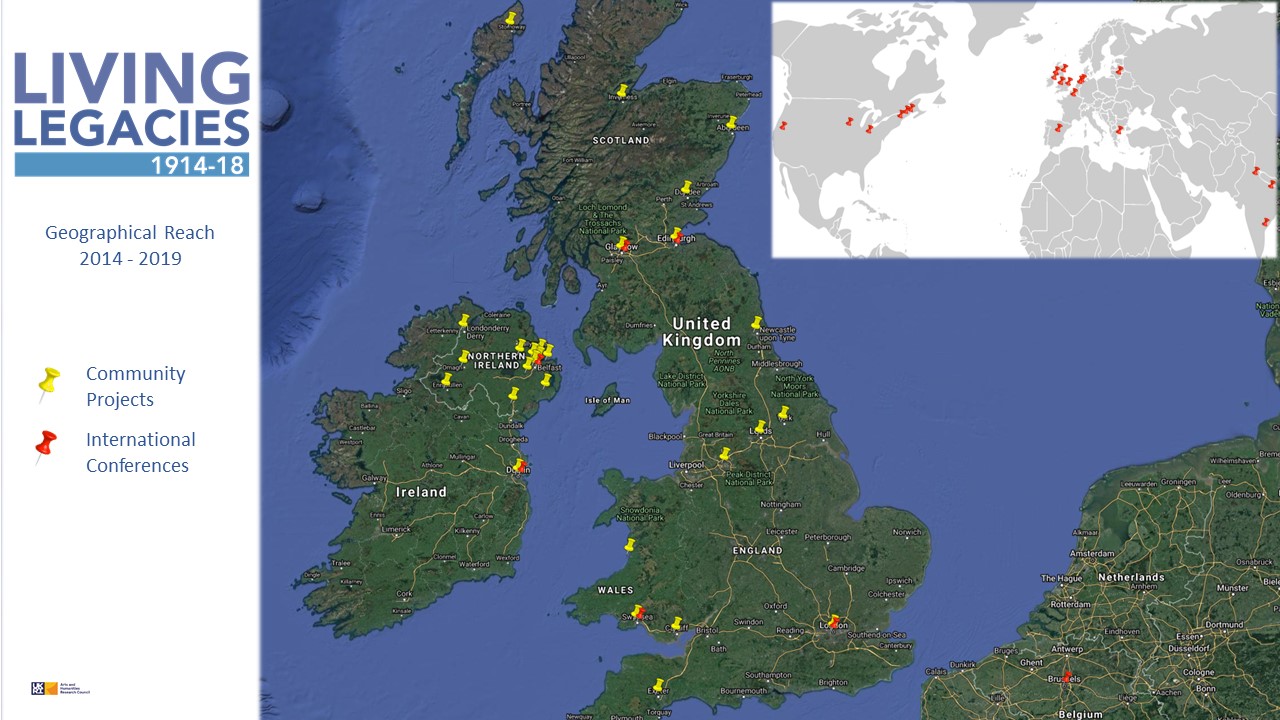Over its six years of operations, the Living Legacies 1914-18 WW1 Public Engagement Centre made a significant impact on the Centenary of WW1 across the home nations of the UK, on local communities, stakeholders and researchers. Our success in realising this is in itself a notable achievement, for both Living Legacies as well as the collective engagement centres’ programme as a whole, and includes particular headline impacts achieved over the course of our Centre’s activities.
Measuring Our Success:

Our wide geographical research is a particularly notable achievement of our Centre’s work and our CIs and Project Officers having Wider connections across communities UK-wide, linking across regions and institutions, and our researchers’ academic and coproduced impacts reaching right across the globe, from Kolkata to California.
Successes lay in working throughout the UK closely with community and sector partners and collaborators, especially the HLF (now NLHF), Imperial War Museum (IWM), the Ministry of Defence (MoD), the Council for British Archaeology (CBA), and museums and community projects at national and local scales. Furthermore, Living Legacies HEI-based researchers succeeded in fostering and supporting new and diverse communities of researchers through a series of public engagement projects, events, outreach and activities, that stretched from the Centre’s original geographical and cultural focus, on Northern Ireland, to reach right across these islands more widely, encompassing and connecting communities nationally in Great Britain, including especially embracing liminal and peripheral regions and communities in Wales, in North-East England and in Scotland.


Living Legacies core research themes of Critical Commemoration & Creative Practice, Digital Heritage & Engagement, and Material Cultures & Landscapes, and its expertise in these areas provided a solid focus for widening the diversity of community Centenary engagements, and the international interest in our partnership working — particularly in providing new perspectives on WW1, its Centenary and its commemoration; shaping research and policy; creating new communities of interest; deepening critical understanding and appreciation of conflict; fostering more inclusive approaches in heritage; creating models of good practice in cross-sector heritage and using conflict to instil community understanding and sharing—were all demonstrated by Living Legacies researchers’ outputs, in publications and conferences globally.
Our work has informed institutional and policy strategies and outcomes, including most significantly for the National Lottery Heritage Fund, but also was explicitly recognised by the DCMS Select Committee in 2018 in its evaluation of the Centenary commemoration efforts. Outlining ‘Lessons from the First World War Centenary’, the Committees highlighted the role of Living Legacies in mitigating local racism and sectarianism in Belfast, and the UK Prime Minister’s special representative for the WW1 centenary, Dr Andrew Murrison MP, said it had enhanced understanding and respect for important events: “It has been that Irish dimension that has been the most heartening and, for me, probably one of the most productive things that we have achieved”.